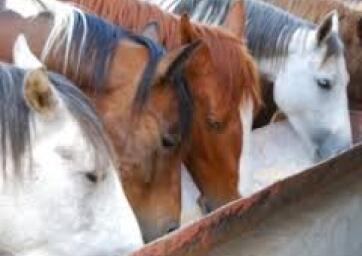
29 March 2017
We all know that forage (hay and grass) is the foundation of your horse’s nutritional requirements. What a horse needs in his diet is often confused with marketing hype! What they need is:
1. High quality forage – hay/grass
2. Calories (very dependent on work load)
3. Nutrients – protein, vitamins and minerals
4. Additional ingredients to address specific issues that individual horse may have.
The benefit of forage is very dependent on the digestion process. As forage makes its way through the intestinal tract to the colon, its fiber component begins to be digested or fermented by the microscopic organisms that live in the hindgut. When these bacteria (good bugs) break down the structural carbohydrates in the forage some of the end products are volatile fatty acids (energy), amino acids, and vitamins.
Because the horse can only eat so much hay or grass in a day, horses that require more calories to maintain their body condition and/or required energy (e.g. competitive horses or pregnant/lactating mares) there may be a need for more calorie-dense feedstuff and that’s where grain comes in. Specifically to add calories. You shouldn’t feed grains to meet specific nutrient requirements – this is done much more effectively through supplements.
Nutrients are provided in many ways;
Whole Grain: a cereal grain that has not been fortified with additional nutrients; may be processed by cracking, crimpling, rolling, or heating e.g. oats, corn, barley. Contain nutrients and high levels of calories.
Fortified Grain: a manufactured feed that includes added protein, vitamins, and minerals e.g. sweet feed/pellets. Often difficult to achieve desired vitamin/mineral levels without over feeding and/or feeding nutrients not required.
Multi-Vitamin/Mineral Supplement: a powder or liquid designed to fill in some of the gaps between the vitamins and minerals. Can be easily administered and exact levels achieved.
Now that the horse is receiving a complete and balanced, forage-based diet, it’s time to see if there are any issues being faced that could benefit from the additional support of targeted ingredients.
In summary feed your horse appropriately by first, focusing on forage; second, ensuring he’s getting the right amount of calories for his workload; third, rounding out his diet with the rest of the vital nutrients protein, vitamins and minerals; then finally address unique concerns that may benefit from a targeted supplement approach. Talk to us or read up about our supplements on our web site – we have an extensive range to cover most nutrient requirements.